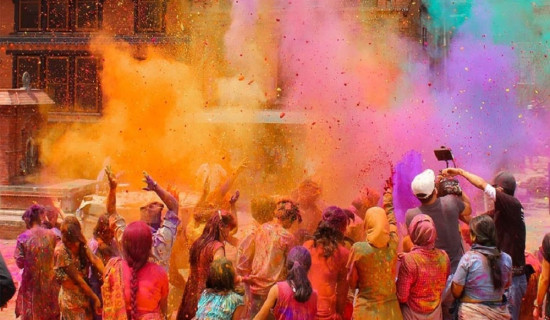- Tuesday, 3 March 2026
Social Safety Key To Poverty Alleviation
Poverty is a global problem and its alleviation is a global concern for ensuring human dignity. Nepal currently hosts about 15 per cent of its population below the national poverty line, and about 18 per cent multidimensionally poor population. In absolute terms, this could be about four to five million people. Globally, out of about eight billion population, about 700 million people are forced to live in extreme poverty and hardships. Recurring shocks and crises push many non-poor below the poverty line. Poverty hinders individuals from leading lives of dignity, opportunity and hope. It is an intricate web of economic and social constraints. At its core, it represents an assault on human dignity. It is a challenging task to overcome all forms of poverty. Various strategic attempts have been made to create a poverty-free world. Consequently, absolute poverty is reducing, though unevenly across population groups and regions.
On 17th October every year, the world unites to commemorate the International Day for the Eradication of Poverty. This day has been observed since 1987 to pay respects to those who had perished from extreme poverty, violence, and hunger around the world. This day renews global community’s efforts to end all forms of poverty from all corners of the earth so that no one is left behind. It aims to promote understanding and dialogue between people living in poverty and society at large. It has been stated that the day highlights the value of cooperation, human rights and social justice in the fight against poverty. It is considered a serious yet hopeful occasion. An annual aspirational theme is also chosen to direct efforts for fast poverty reduction. The special theme for this year's is "Decent Work and Social Protection: Putting Dignity in Practice for All.”
Decent work
This theme reveals the close relationship between poverty reduction and decent pay, working conditions and social protection for upholding human dignity. Human dignity can only be realised if there is no poverty. Poverty and human dignity cannot go together. Human dignity also justifies human rights. Dignity is something all humans are born with. It is inner human force. It is all about providing equal respect and honour to all irrespective of their social, cultural or economic identity. In the absence of human dignity or in the presence of poverty, social divisions and discriminations are invited which bring oppression and suppression. Consequently, violence and destruction occur in the society.
This year’s theme reflects that the routes to human dignity are decent work and social protection. Work is any activity undertaken by people for earning their lives. Usually, this is paid. Work can be decent or indecent. Any work that is productive, formal, and ensures labour rights and has good working conditions is considered to be decent work. Such work pays enough, and is humane and enjoyable. In many parts of the world, this situation does not exist. Work is precarious, lowly-paid, exploitative, dirty, dangerous and degrading. Workers are not allowed to be united and collective bargaining is not in practice. Such work is clearly indecent and undermines human dignity.
Social protection is also considered to be a crucial factor for tackling poverty and promoting human dignity. Social protection is all about protecting people against all forms of poverty, vulnerability and inequality. It may come in the form of cash, kind, grant, subsidy, insurance support or public services. Evidence shows that social protection has been instrumental in alleviating poverty around the globe. Governments around the world have been extending social protection coverage. However, half of the world population still remain uncovered by any form of protection. For Nepal, this is around 70 per cent. This undermines poverty reduction and human dignity.
Inadequate decent work and social protection coverage have resulted in poverty, inequality and discrimination. Over a billion individuals lack access to basic necessities of life. Billions more grapple with the absence of sanitation, energy, job opportunities, exploitation in the world of work and stable housing. Inequality is threatening stability, peace and harmony in many parts of the world. Discrimination and exclusion, particularly against women, youth and girls, exacerbate the suffering. This situation demands for ensuring decent work and extending social protection coverage.
Legal protections
It has been noted that that almost two-thirds of the world’s working population — over two billion people — are informal workers. Most of these workers do not benefit from any form of legal protection, including minimum wages, hours of work, health, safety or insurance covering workplace accidents or job loss. Fifty-eight per cent of informal workers are women, who are also the lowest paid and subject to gender-based discrimination and sexual harassment. The absence of legal protections leaves informal workers vulnerable to economic insecurity and exploitation, leading to poverty and loss of human dignity. UNICEF estimates that in the developing world, one in four children aged 5 to 17 are engaged in labour that is detrimental to their education, health and development. Nepal also faces these problems, and in much worse order.
Solutions lie in reforming labour market and social protection with the clear understanding of their linkage for poverty reduction. Creating productive and formal sector jobs should be the top priority of labour market reform. Encouraging domestic production will create more jobs, and putting labour regulations in place will ensure decent work. Providing trainings to workers will enhance their productivity. Extending social protection with a mixture of tax-financed and contributory schemes will be instrumental in reducing poverty and vulnerability of all population groups. We should carry out these reforms in order to meet our obligation to end all forms of poverty everywhere as stated in SDG and national development plan. This is the surest way to promote human dignity.
(Dr. Bhusal is an expert in poverty, employment and social protection.)
















